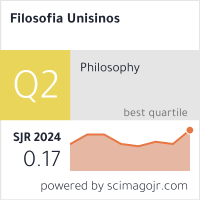A ética protestante e o reencantamento do mundo na sociedade do trabalho: notas a partir de Max Weber
DOI:
https://doi.org/10.4013/fsu.2022.232.03Resumen
Este artigo pretende investigar, partindo das ideias de A Ética Protestante e o “Espírito” do Capitalismo, de Max Weber, a relação entre o desencantamento do mundo e a Reforma Protestante, bem como a hipótese de que o desencantamento gerou, ao mesmo tempo, um novo encantamento no capitalismo e em sua nascente sociedade do trabalho. Segundo Weber, à medida que o cotidiano, na modernidade, foi tomado por uma racionalização cultural e social, dissolveram-se também as formas de vida tradicionais. Na ética protestante, a salvação vincula-se à vocação intramundana e à santificação da vida cotidiana por meio do trabalho. Daí, falarmos de um desencantamento, como Weber conceitua, e, ao mesmo tempo, de um reencantamento à luz de uma nova religiosidade atuante no mundo do trabalho capitalista. É justamente esse processo que permitiu Walter Benjamin, por sua vez, considerar o capitalismo como uma religião, com seus cultos, ritos e símbolos, levando a análise weberiana adiante, enfatizando o capitalismo como religião. Almejamos, assim, investigar a hipótese de que a tese weberiana do desencantamento do mundo igualmente culmina em sua inversão, ao falarmos de um reencantamento do mundo, agora sob a égide do trabalho capitalista e de sua racionalização econômica.
Palavras-chave: Weber, desencantamento, ética protestante, reencantamento.
Descargas
Métricas
Descargas
Publicado
Cómo citar
Número
Sección
Licencia
Derechos de autor 2021 Filosofia Unisinos / Unisinos Journal of Philosophy

Esta obra está bajo una licencia internacional Creative Commons Atribución 4.0.
Concedo a revista Filosofia Unisinos – Unisinos Journal of Philosophy o direito de primeira publicação da versão revisada do meu artigo, licenciado sob a Licença Creative Commons Attribution 4.0 (que permite o compartilhamento do trabalho com reconhecimento da autoria e publicação inicial nesta revista).
Afirmo ainda que meu artigo não está sendo submetido a outra publicação e não foi publicado na íntegra em outro periódico e assumo total responsabilidade por sua originalidade, podendo incidir sobre mim eventuais encargos decorrentes de reivindicação, por parte de terceiros, em relação à autoria do mesmo.











